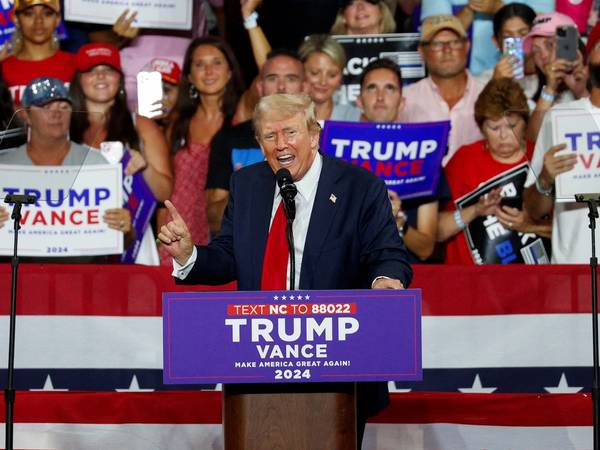Commentators and analysts in Iran believe that negotiations with the Trump administration will be feasible if he wins the US elections, despite his tough stance against the Islamic Republic during his first term.
Former diplomat Nasrollah Tajik told reporters in Tehran that although former Iranian government's negotiations with the United States cannot be relied upon, Tehran can still pursue further discussions with Washington regarding its nuclear program and US sanctions.
Tajik however, noted that before any negotiations, the Iranian leadership should clarify its policy toward the United States. Meanwhile, he called on Iranian officials to sort out the technical problems with the UN nuclear watchdog IAEA as a first step for starting negotiations with Washington.
Former US President Donald Trump said recently that he was ready to “make a deal” with Iran on “everything” toward the end of his term, claiming that Tehran also “wanted” a deal because the country was in dire straits as a result of his tough sanctions.
Trump also said last week during the Republican National Convention that “Iran was broke. They had no money. I sanctioned the countries that wanted to buy oil from Iran. And I would’ve made a fair deal with Iran. I was gonna get along with Iran,” adding that “The deal was simple: Iran can’t have a nuclear missile. It cannot have that nuclear capability. Other than that, we talk about everything. They would’ve been very happy.”
Following the election of Masoud Pezeshkian and his pragmatic views about negotiations with the United States expectations grew in Iran about possible talks, albeit after the US election. Several Iranian politicians and commentators have said that Iran is willing to talk with the United States no matter who is elected President in Washington in November.
Trump's possible re-election worries the government in Tehran, that has been able to increase its oil exports during Joe Biden's presidency. Trump can re-invigorate the enforcement of US sanctions and possibly add new ones.
However, Abdolreza Farajirad, a professor of international relations in Tehran was more optimistic in an interview with Khabar Online website. "There are some hopes that the Democratic Party might win the 2024 US presidential election. If such optimism arises, the Iran-US negotiations might become more serious even before the upcoming US presidential election on November 5th. However, right now, I think the negotiation process is not moving quickly, and everyone is waiting to see what will happen in the future," he said.
However, Tajik, the former diplomat, highlighted that there won't be any talks during the next six months, and the subjects of the negotiations, though essential, are still not well defined. He noted the difficulty in agreeing on a single topic, suggesting that discussions could extend beyond the scope of the 2015 nuclear deal (JCPOA). Tajik emphasized that the most crucial factor is the political willingness from both sides to engage in negotiations.
He criticized the previous governments, specifically the Raisi administration's negotiations with the United States as weak and unreliable. Additionally, he pointed out that the revival of the JCPOA does not seem to be the focus of upcoming discussions.
Tajik added that if Trump wins the US election, there will be a better chance for an agreement. However, the negotiations are likely to be direct and may include issues beyond the nuclear topic, as suggested by Trump's statements.
Meanwhile, Iranian Foreign Policy Analyst Ali Bigdeli told Nameh News website in Tehran that there is a 90 percent likelihood for Trump's victory in the elections. He insisted that talks with the Republicans are as feasible as negotiations with IUS Democrats.
He went on to argue that traditionally the Republicans are focused on US domestic politics while the Democrats are more conscious of what goes on outside the United States. Nonetheless, If Iran shows some flexibility, negotiating with the Trump Administration can be as feasible as talks with the Biden Administration.
